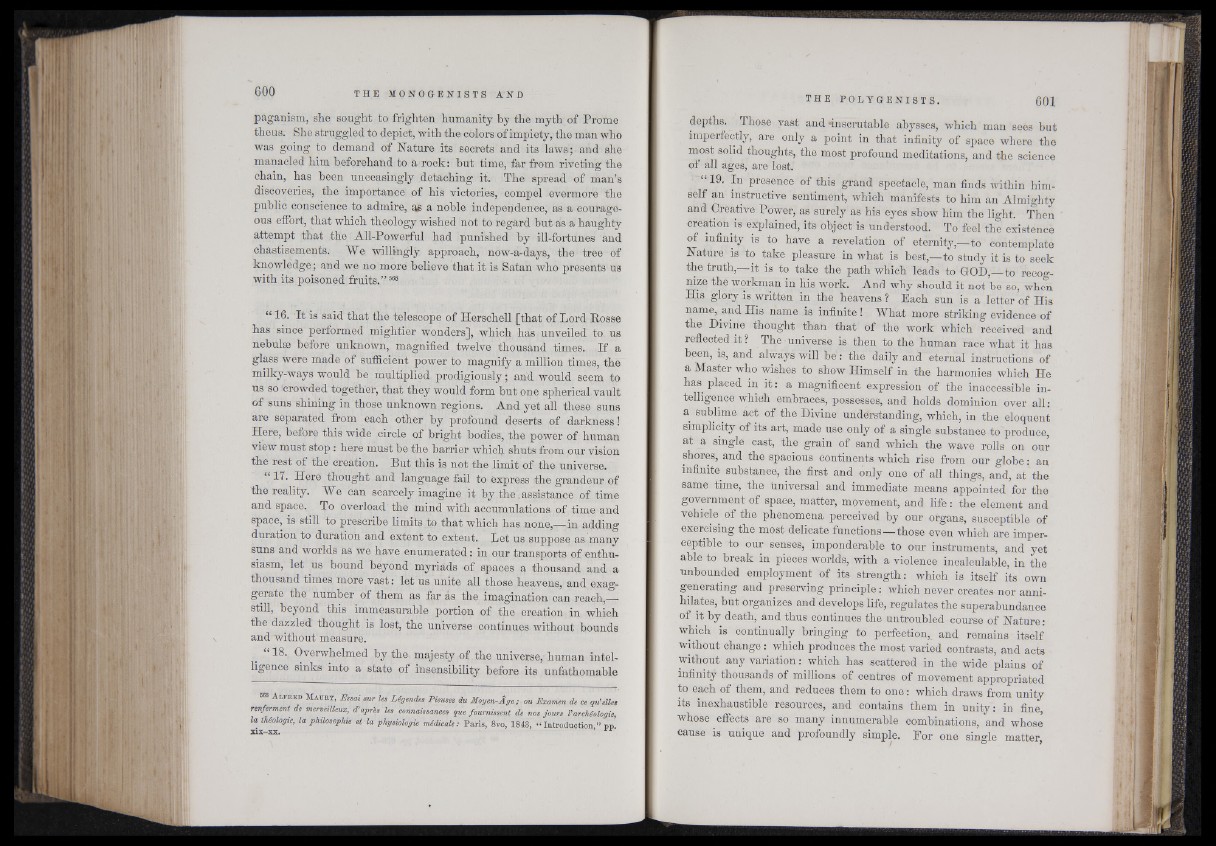
paganism, she sought to frighten humanity by the myth, of Prome
theus. She struggled to depict, with the colors of impiety, the man who
was going to demand of Nature its secrets and its laws ; and she
manacled him beforehand to a rock: but time, far from riveting the
chain, has been unceasingly detaching it. The spread of man’s
discoveries, the importance of his victories, compel evermore the
public conscience to admire, ae a noble independence, as a courageous
effort, that which theology wished not to regard but as a haughty
attempt that the All-Powerful had punished by ill-fortunes and
chastisements. We willingly approach, now-a-days, the tree of
knowledge; and we no more believe that it is Satan who presents us
with its poisoned fruits.” 868
“ 16. It is said that the telescope of Herschell [that of Lord Posse
has since performed mightier wonders], which has unveiled to us
nebulse before unknown, magnified twelve thousand times. If a
glass were made of sufficient power to magnify a million times, the
milky-ways would be multiplied prodigiously; and would seem to
us so 'crowded together, that they would form but one spherical vault
of suns shining in those unknown regions. And yet all these suns
are separated from each other by profound deserts of darkness!
Here, before this wide circle of bright bodies, the power of human
view must stop: here must be the barrier which shuts from our vision
the rest of the creation. But this is not the limit of the universe.
St 17. Here thought and language fail to express the grandeur of
the reality. We can scarcely imagine it by the.assistance of time
and space. To overload the mind with accumulations of time and
space, is still to prescribe limits to that which has none,-—in adding
duration to duration and extent to extent. Let us suppose as many
suns and worlds as we have enumerated: in our transports of enthusiasm,
let us bound beyond myriads of spaces a thousand and a
thousand times more vast: let us unite all those heavens, and exaggerate
the number of them as far as the imagination can reach,—
still, beyond this immeasurable portion of the creation in which
the dazzled thought is lost, the universe continues without bounds
and without measure.
18. Overwhelmed by the majesty of the universe,'human intelligence
sinks into a state of insensibility before its unfathomable
A l f r e d M a ü r y , Essai,sur les Légendes Pieuses du Moyen-Âge; ou Examen de ce qu’elles
renferment de merveilleux, d’après les connaissance» que fournissent de nos jours V archéologie,
la théologie, la philosophie et la physiologie médicale: Paris, 8vo, 1843, “ Introduction ” pp.
xix-xx. ’
depths. Those vast and «inscrutable abysses, which man sees but
imperfectly, are only a point in that infinity of space where the
most solid thoughts, the most profound meditations, and the science
of all ages, are lost.
19. In presence of this grand spectacle, man finds within himself
an instructive sentiment, which manifests to him an Almighty
and Creative Power, as surely as his eyes show him the light. Then
creation is explained, its object is understood. To feel the existence
of infinity is to have a revelation of eternity,— to contemplate
Nature is to take pleasure in what is best,—to study it is to seek
the truth,— it is to take the path which leads to GOD,—to recognize
the workman in his work. And why should it not be so, when
His glory is written in the heavens ? Each sun is a letter of His
name, and His name is infinite! What more striking evidence of
the Divine thought than that of the work which received and
reflected it? The universe is then to the human race what it has
been, is, and always will b e : the daily and eternal instructions of
a Master who wishes to show Himself in the harmonies which He
has placed in it: a magnificent expression of the inaccessible intelligence
which embraces, possesses, and holds dominion over all:
a sublime act of the Divine understanding, which, in the eloquent
simplicity of its art, made use only of a single substance to produce,
at a single cast, the grain of sand which the wave rolls on our
shores, and the spacious continents which rise from our globe; an
infinite substance, the first and only one of all things, and, at' the
same time, the universal and immediate means appointed for the
government of space, matter, movement, and life: the element and
vehicle of the phenomena perceived by our organs, susceptible of
exercising the most delicate functions—those even which are imperceptible
to our senses, imponderable to our instruments, and yet
able to break in pieces worlds, with a violence incalculable, in the
unbounded employment of its strength: which is itself its own
generating and preserving principle: which never creates nor annihilates,
but organizes and develops life, regulates the superabundance
of it by death, and thus continues the untroubled course of Nature:
which is continually bringing to perfection,, and remains itself
without change: which produces the most varied contrasts, and acts
without any variation: which has scattered in the wide plains of
infinity thousands of millions of centres of movement appropriated
to each of them, and reduces them to one : which draws from unity
its inexhaustible resources, and contains them in unity: in fine
whose effects are so many innumerable combinations, and whose
cause is unique and profoundly simple. For one single matter,